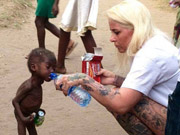


A person points at an image of Aedes Aegypti mosquito, carrier of the Zika virus, on a laptop screen, in Santiago, capital of Chile, on April 18, 2016. (Xinhua/Jorge Villegas)
GENEVA, May 18 -- The overall risk of a Zika virus outbreak across Europe is expected to increase in late spring and summer, with 18 countries in particular having a moderate likelihood of local transmission, the WHO Regional Office for Europe said Wednesday.
WHO assessed the risk of an outbreak in 51 of 53 member states in the region and Lichtenstein, based on the combination of two factors: the likelihood of Zika virus spread and existing national capacity to prevent or rapidly contain local transmission.
The report said the risk of local Zika virus transmission in Europe is low during the winter season, the mosquitoes are still inactive. However, in late spring and summer, the risk for spread of Zika virus increases.
While A. aegypti is the primary Zika vector, A. albopictus, which is present in 20 European countries, has been shown to be able to transmit Zika virus and remains a potential vector for its spread.
In 18 countries in the European region, there is a moderate likelihood of local Zika virus transmission. Among them, France, Italy, Malta, Croatia, Israel and Spain have the highest risk.
In limited geographical areas, namely Madeira Island (Portugal) and the north-eastern Black Sea coast, there is a high likelihood of local Zika virus transmission.
WHO said these countries and areas should prepare well in order to protect their populations from the spread of Zika virus disease and its potential neurological complications, including microcephaly and Guillain-Barre syndrome.
Overall, the risk of a Zika virus outbreak across the WHO European region is low to moderate during late spring and summer. A total of 36 states have a low, very low or no likelihood, owing to the absence of Aedes mosquitoes and/or suitable climatic conditions for their establishment.
"With this risk assessment, we at WHO want to inform and target preparedness work in each European country based on its level of risk. We call particularly on countries at higher risk to strengthen their national capacities and prioritize the activities that will prevent a large Zika outbreak," Zsuzsanna Jakab, WHO regional director for Europe said.
Day|Week

 China's first intelligent security robot debuts in Chongqing
China's first intelligent security robot debuts in Chongqing A Total of 3,552 Subscribers Vanish In Two Days; YouTube Closes All Doors to Users’ Inquiries
A Total of 3,552 Subscribers Vanish In Two Days; YouTube Closes All Doors to Users’ Inquiries Out of this world! Futuristic UFO-shaped yacht has its own garden and a stunning underwater viewing deck
Out of this world! Futuristic UFO-shaped yacht has its own garden and a stunning underwater viewing deck An old tea house in Chengdu
An old tea house in Chengdu Furious Customer Crushes All the Buns from Vendor Just Because He Was Given the Wrong Flavor
Furious Customer Crushes All the Buns from Vendor Just Because He Was Given the Wrong Flavor 20 post-90s couples hold ’naked marriage‘ in E. China
20 post-90s couples hold ’naked marriage‘ in E. China Female official wearing traditional Han costume to promote local tourism
Female official wearing traditional Han costume to promote local tourism Over 12,000 Runners Seek Medical Care in S China’s Marathon
Over 12,000 Runners Seek Medical Care in S China’s Marathon Six Luxury Sports Cars Totaled after Fail Attempts to Cross China’s Most Perilous Highway Linking SW China’s Sichuan and Tibet
Six Luxury Sports Cars Totaled after Fail Attempts to Cross China’s Most Perilous Highway Linking SW China’s Sichuan and Tibet Incredible Transformation: “Witch Child”Whose Parents Left Him for Dead in Nigerian Makes Speedy Recovery
Incredible Transformation: “Witch Child”Whose Parents Left Him for Dead in Nigerian Makes Speedy Recovery